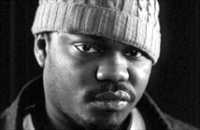The best rappers don't make demos. Even more ironically, they don't look for record deals. Record deals look for them. When Beanie Sigel proclaimed on the remix to Jay-Z's "Money, Cash Hoes" to have been put onto this music industry "without Unsigned Hype or Battle of the Beats," he wasn't kidding. With his much anticipated debut album, The Truth and nothing but the truth, Beanie Sigel will prove why one of his verses equals another rapper's demo.
"I didn't have to send in a demo or none of that," Beanie speaks confidently. Rightfully so, because ever since the rapper laid down his verse for "1000 Bars" on DJ Clue's mix tape, he has been quickly recognized every time he picks up the mic. With that memorable verse, not only did he catch the attention of a number of record labels, but he managed to land a deal with one of the most prestigious in hip-hop, Roc-a-fella. Not only was he noticed by other emcees, he was noticed by arguably the best, Jay-Z. Adding himself to an already critically-acclaimed roster, Beanie Sigel takes pride in being signed to Roc-a-fella Records, "Roc-a-fella is a winning team, and when you're on a winning team, you always get a ring, even if you ride the bench. Only there ain't no bench riders on our team -- we're all starters."
No doubt, Beanie is far from a bench warmer, and he plays the background to none of the label's heavyweights either. Within a short time, Beanie has built up a demand for his own solo project. Since he blessed "Reservoir Dogs" (Vol. 2 Hard Knock Life, 1998) with the "Quiet town and tie it down" quote, the Philly native has been one of the most sought after artists in hip-hop. As a guest rapper on so many collaborations, Beanie Sigel has almost always overpowered other emcees with two very distinct characteristics, his witty-meets-hardcore lyrics and unique vocal delivery.
Lyrically, Beanie Sigel can take anything and turn it into a rhyme, as he did by turning the game of Monopoly into the rap game on "Crew Love." And on his album, Beanie claims to have a lot more where that came from. "I got lyrics for days," comments Beanie, "I write a verse, leave it alone, and come back to it later. I try to make that perfect rhyme, that's what I strive for. A lot of people are just rappin'. I don't rap, I talk shit. It just so happens that it rhymes."
His rhymes are emphasized by a voice that sounds like no other. "At first, I didn't like my voice when I heard it on tape. I wanted a more raspy voice. I didn't think it was strong enough. But then everyone else liked it, they said I sound like I'm from down south but I moved to New York. Jay-Z says I be killing 'em with that accent."
But despite where he's from, Beanie Sigel has already locked down the streets, whether it's the streets of New York or his hometown of Philly. "What A Thug About," one of Beanie's first solo joints, is already a street anthem and gives just a small taste of the thugness that Beanie is bringing on his album. With guest artists such as Jay-Z and Memphis Bleek and production by Ruff Ryders', Swizz Beatz and Suave House's, Tony Draper, Sigel's album is hotter than the inside of a Chevy Nova with no air conditioning, driving through the deserts of Africa. He agrees, "I'm bringing nothing but fire. They call the fire department every time I leave the studio."
Beanie Sigel has more plans than just the studio though. "I got to do it all. I'm trying to have my own company, my own record label, all that." After closing his deal with Roc-a-fella, Beanie moved on to managing, and is responsible for getting his old partner, Murda Mill signed to Jive Records. For now, Beanie will focus on his own rap career, as his album will further introduce him to the hip-hop audience. "I love the attention, especially from the kids. When little kids know your rhymes, you know you made it."
Some might say that because Beanie got put on so quickly, he has yet to pay his dues. But with The Truth, Beanie is ready and willing to do so. "Right now, since I never had a demo and I really didn't put in work as far as performing at the little spots or clubs, getting known in the underground, or rhyming on a lot of mixtapes, some might hate and say that I didn't pay my dues," he confesses. "To me, this album is my first demo to the world. I'm making history. I'm the first rapper to sell my demo in stores."
